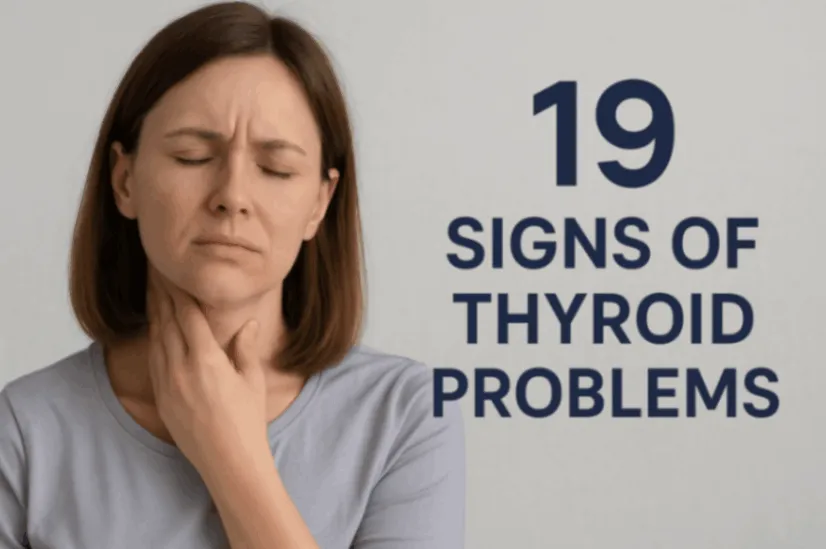|
High TPO antibodies usually signal thyroid autoimmunity, not cancer. Most cases link to Hashimoto’s or Graves’ disease. Cancer risk exists but is lower, requiring further tests for confirmation. |
Seeing high TPO antibodies on your blood test can be alarming. Naturally, your first thought might be, Do high TPO antibodies mean cancer? It’s a common concern, after all, the word “antibody” sounds serious, and cancer is frightening.
The truth is, most of the time, elevated TPO levels indicate thyroid autoimmunity rather than malignancy. However, research suggests a slight link between autoimmune thyroid conditions and thyroid cancer, which is why monitoring your thyroid health is important.
In this article, we’ll break down what high TPO antibodies mean, their typical causes, potential risks, and when it’s crucial to consult your doctor. Let’s explore!
Do High TPO Antibodies Mean Cancer?
Short answer: No, high TPO antibodies do not mean you have thyroid cancer.
Thyroid peroxidase (TPO) antibodies rise when your immune system mistakenly attacks your thyroid. This is most common in autoimmune thyroid conditions, not cancer.
Here’s how often TPO antibodies appear in different thyroid conditions:
-
Hashimoto’s thyroiditis: 80–95% of cases
-
Graves’ disease: 65–80%
-
Thyroid cancer: Only ~10–20%
-
Healthy people (no thyroid disease): 10–15%
So, most people with high TPO antibodies don’t have cancer, and many healthy individuals test positive, too.
Key point: High TPO antibodies signal autoimmune thyroid inflammation, not a cancer diagnosis.
Doctors become concerned only when TPO antibodies co-exist with other warning signs, such as:
-
Thyroid nodules
-
Suspicious ultrasound findings
-
Persistent neck swelling
-
History of radiation exposure
-
Rapidly growing lump or hoarseness
What Research Shows About TPO Antibodies & Cancer Risk
Across 12 studies (20,330 people), TPO-positive individuals had 1.57× higher odds of differentiated thyroid cancer (95% CI: 1.00–2.45).
However, and this is crucial, when researchers removed one large study in sensitivity analysis, the association disappeared. There were no consistent differences in:
-
Tumor size
-
Lymph-node spread
-
Extrathyroid growth
-
Recurrence rate
Meaning: High TPO antibodies do not reliably indicate more aggressive cancer.
Bottom Line: High TPO antibodies are usually linked to autoimmune thyroid disease, not cancer. For most people, they are not a cancer warning sign on their own.
If you have elevated TPO antibodies, your doctor may monitor thyroid function and ultrasound findings, but additional risk factors, not the antibody level itself, guide cancer suspicion.
What High TPO Antibodies Usually Indicate?
A high result on this test almost always points toward thyroid autoimmunity. In simple terms, the immune system has started reacting to thyroid tissue, and this can set off inflammation or gradual changes in function. Doctors often see this pattern long before symptoms appear, which is why follow-up testing is so important.
Conditions commonly linked to raised TPO antibodies include:
-
Hashimoto’s thyroiditis: Over time, the thyroid slows, leaving people tired, constipated, cold, or gaining weight without a clear reason.
-
Graves’ disease: Here, the thyroid shifts into overdrive, speeding up metabolism, causing a fast heartbeat, nervous energy, and sometimes bulging eyes.
-
Postpartum thyroiditis: A temporary form that may strike after childbirth, creating swings between an overactive and underactive thyroid.
-
Future risk: Some people with no thyroid disease yet still carry high antibodies, which can increase the chance of problems later.
So when a lab report shows elevated TPO antibodies, meaning abnormal, the first thought is usually autoimmune thyroid disease. The thyroid peroxidase antibody cancer connection is far weaker and only considered if other warning signs appear.
Signs and Symptoms to Watch For
Numbers on a report don’t tell the whole story. Symptoms help connect the dots. Not everyone with high antibodies feels unwell. Some notice obvious changes, others feel fine for years.
Common thyroid-related symptoms:
-
Feeling exhausted even after a full night's sleep.
-
Sudden weight changes.
-
Hair falling more than usual or nails breaking.
-
Feeling cold when others are comfortable, or too hot when others are fine.
-
Swelling at the base of the neck.
Possible overlap with cancer warning signs:
-
A painless neck lump.
-
Trouble swallowing or feeling food “stuck.”
-
A voice that becomes hoarse without reason.
That’s why people ask again and again: Do high TPO antibodies mean cancer? Antibodies alone can’t answer that. Doctors use symptoms, scans, and tests to decide.
Do High TPO Antibodies Increase Cancer Risk?
This is where research comes in. Studies since 2023 show antibodies do not necessarily raise cancer danger.
-
Italian multicenter study (2023): Patients with autoimmune thyroid disease were found to have smaller, lower-risk cancers. They did show persistent biochemical markers but no greater recurrence after one year.
-
Study on 317 papillary thyroid cancer patients with Hashimoto’s (2025): Those negative for both TgAb and TPOAb had a higher chance of aggressive features. TPOAb-positive patients had a reduced risk of aggressive disease.
So, while the thyroid antibodies and cancer connection exists, it’s not direct. High antibodies point more to autoimmune thyroiditis. Cancer risk is checked only when nodules or suspicious symptoms are present.
Quick recap:
-
Most patients with high antibodies have autoimmune thyroiditis, not cancer.
-
Autoimmune patients may actually develop milder cancer if it occurs.
-
Risk evaluation depends on the whole picture, not one test.
How to Interpret TPO-Antibody Test Results and Follow-Up
Here’s a practical algorithm (for readers in India or those following US lab practice) that we use in the clinic.
-
You receive a lab report showing high anti-TPO antibodies.
-
Check your TSH + Free T4 (and T3 if needed) to assess thyroid function.
-
Review symptoms and neck exam: Do you feel a lump, have hoarseness, swallowing issues, or neck swelling?
-
If any of the following present → order thyroid ultrasound:
-
A palpable nodule.
-
Neck swelling or swelling of lymph nodes.
-
Family history of thyroid cancer or prior radiation.
-
If ultrasound shows suspicious features (hypoechoic nodule, irregular margin, micro-calcifications) → fine needle aspiration biopsy (FNAC).
-
If no suspicious findings and thyroid function is normal → monitor every 6-12 months: repeat thyroid function tests, antibody levels, and exam.
-
If thyroid function becomes abnormal (hypothyroid or hyperthyroid) → treat accordingly while continuing monitoring for nodules..
Managing High TPO Antibodies: Treatment, Monitoring & Lifestyle
Even though the antibody number itself is not treated in isolation, there is meaningful action for you.
Medical management
- If you develop hypothyroidism (common in Hashimoto’s) → treatment: levothyroxine to restore normal hormone levels.
- If you develop hyperthyroidism (less common in this situation) → appropriate anti-thyroid medications under endocrinologist care.
- The antibody level itself is not treated. What matters is your thyroid hormone function + structural changes.
Lifestyle support
- Diet: Focus on fresh fruits, vegetables, and lean protein. Avoid refined sugar and ultra-processed foods. These support overall health, not specifically antibody reduction.
- Supplements: Some suggest selenium may reduce antibody levels; vitamin D deficiency correction also helps thyroid health. Evidence is still limited.
- Stress management: Chronic stress may worsen autoimmune activity. Simple tools, walking, deep breathing, and mindfulness, can help.
- Monitoring: Keep your doctor updated if you notice changes in neck feel, voice, swallowing, or energy levels.
Monitoring plan
- Blood tests every 6–12 months: TSH + Free T4 + (optionally) TPO antibodies.
- Ultrasound: only if you have a neck lump, nodule history, or new symptoms.
- Medication adjustment: guided by hormone function, not just antibody number.
Who Should Be More Concerned? Thyroid Cancer Risk Factors Beyond TPO
Even if your TPO antibody number is high, most people won’t have thyroid cancer. But here are the risk factors that raise concern:
-
Family history of thyroid cancer or genetic syndromes (MEN2, FAP).
-
Radiation exposure to the neck or head (especially).
-
Age over 45 years (risk tends to rise) and male gender (though women get thyroid disease more often).
-
Thyroid nodules: especially if large, growing, or showing suspicious ultrasound features.
-
Compression symptoms: difficulty swallowing, persistent hoarseness, neck pain, or swelling.
If you carry one or more of these and high TPO antibodies, we will intensify surveillance. In contrast, if you only have high TPO antibodies and none of the above, then standard monitoring is enough.
When to See a Doctor
Call your doctor (or endocrinologist) if you notice:
-
A new lump or swelling at the base of your neck.
-
Persistent hoarseness without an obvious cause.
-
Difficulty swallowing or breathing.
-
Rapid change in a known thyroid nodule.
-
Significant symptoms of hyper- or hypothyroidism.
Even if none of these symptoms are present, an elevated TPO result still means we watch, don’t ignore. At minimum: review it, record it, and plan follow-up. Catching changes early gives you better peace of mind.
Conclusion
So, does high TPO antibodies mean cancer? In most cases, no. Elevated anti-TPO is a strong sign of thyroid autoimmunity, not a cancer diagnosis. The research shows a modest association (OR ~1.6) with differentiated thyroid cancer, yet tumour behaviour is not clearly worse in these cases.
The bigger risk factor is the presence of autoimmune disease itself (for example, Hashimoto’s thyroiditis) and, more importantly, the structural changes in the thyroid, nodules, swelling, and ultrasound findings.
Focus on regular monitoring, correct thyroid hormone function, and a smart lifestyle. If you notice neck changes, hoarseness, or swallowing trouble, act. Otherwise, document your lab report, check again in 6–12 months, and keep in touch with your endocrinologist.
अक्सर पूछे जाने वाले प्रश्नों
Can high TPO antibodies go away?
Not usually. They tend to stay elevated in people with autoimmune thyroid disease.
Should I worry about high TPO antibodies?
Not necessarily. If thyroid function is normal, monitoring is enough.
Do high TPO antibodies cause symptoms?
Not directly. Symptoms come from thyroid hormone imbalances.
Can diet help lower TPO antibodies?
Some foods may reduce thyroid inflammation, but diet alone won’t lower antibody levels.
Should I get a biopsy if my TPO antibodies are high?
Only if thyroid nodules or abnormal symptoms appear.
Can high TPO antibodies turn into cancer?
No. They reflect autoimmunity, not direct cancer risk. Only nodules or abnormal imaging raise concern.
What do high TPO antibodies mean with normal thyroid function?
It means the immune system is active. You may never develop a disease, but doctors keep monitoring.
Do elevated TPO antibodies always mean thyroid cancer?
No. Most cases point to autoimmune thyroiditis, not cancer. Only 10–20% of thyroid cancers show antibodies.
What to do if TPO antibodies are high?
Continue receiving follow-up care, have your thyroid function checked frequently, and maintain your health by managing your stress and diet.
How to lower TPO antibodies naturally?
Some evidence suggests that selenium or vitamin D may help, but results vary. Focus on diet, movement, and stress balance.
-User-1754380331.png)
लेखक





